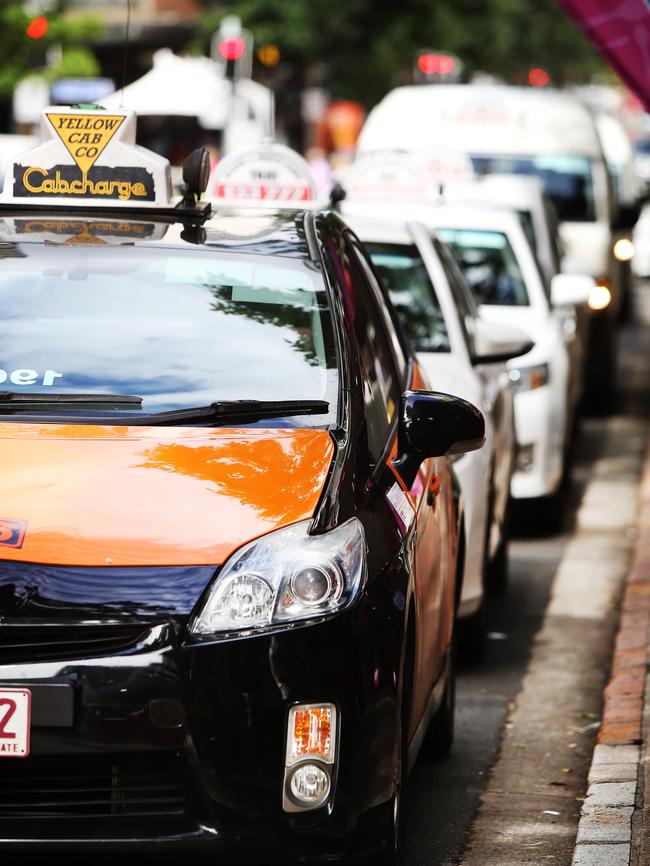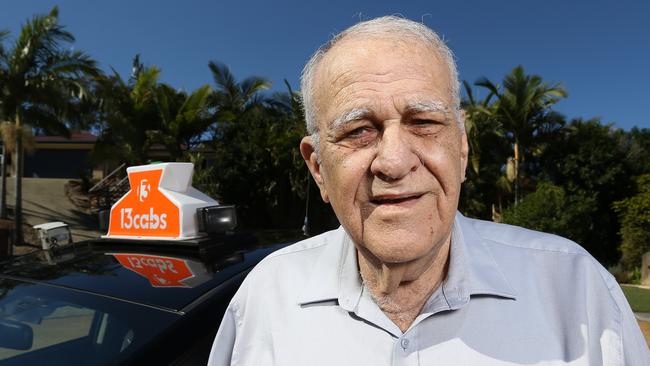Taxi drivers on the road to bankruptcy
WITH the value of Queensland’s taxi industry having plunged as much as 80 per cent since the arrival of ride share companies, drivers have shared their stories of shattered retirements and crippling debt.
QLD Business
Don't miss out on the headlines from QLD Business. Followed categories will be added to My News.
THE value of Queensland’s taxi industry has plunged as much as 80 per cent since Uber and other ride share companies disrupted one of the state’s most regulated industries.
Licences that once sold for more than $500,000 are now struggling to attract a quarter of their original value with owners outraged after governments from both sides of politics had been promising for decades they would never deregulate the industry.

The pain isn’t isolated to regions where Uber is operating, with equally dramatic crashes in rural areas where ride-sharing businesses are yet to reach.
Across Queensland, average taxi licence prices have fallen 77 per cent from $380,941 in 2012 to just $85,676 this year.
In Brisbane, average prices dropped 74 per cent from $417,309 in 2014 to $105,775 this year. In Toowoomba, prices have fallen 87 per cent to $42,333, Sunshine Coast values dropped 81 per cent $78,750 and the Gold Coast has experienced a 64 per cent fall from $503,060 to $179,894.
Taxi Council of Queensland chief executive Blair Davies said the value of licences had been “decimated”.
“What we’re seeing now is many of those mum and dad investors who bought these licences and were self-funded retirees are now heading off to Centrelink and trying to get pensions and it’s a terrible thing,” he said. “Some owners have sat and watched as their asset value has gone down by $400,000 plus and it’s devastating for them.”
The Government has provided some “transitional” payments to licence owners but they were taxable, limited to $20,000 per licence and capped at a maximum of two licences. Mr Davies said it was crucial the Government intervened and “levelled the playing field”, with huge discrepancies in the fees and regulations faced by taxi and Uber drivers.
“We’re hoping the Government will be open and honest to accepting there has been a range of unintended consequences of their regulation and they need to make amends, particularly for the damage they’ve done to licence holders,” he said.
Uber started operating illegally in Brisbane in late 2014 and aggressively lobbied successive State Governments until ride sharing was legalised statewide in September 2016.
Many operators believe the industry has hit rock bottom and have called 2018 the worst year ever. Revenues and driver earnings have also been cut in half with many in the industry admitting they failed to recognise the mortal threat Uber represented and did not launch an adequate counter attack.
Passengers have been the big winners with thousands of extra cars on the roads generally offering lower prices.
Splinter lobby group the Queensland Taxi Licence Owners’ Association, which formed after believing TCQ had not been militant enough fighting Uber, has been part of a recent legal push to sue the State Government over the loss in licence values. Association president Paul Scaini said the Government should pay decent compensation to all licence owners and then ensure taxi and ride share operators paid the same costs to keep their cars on the road.
“The licence owners, who partnered with the government, spending hundreds of thousands of dollars, they’ve effectively been screwed because their returns have dropped from $3000 to say $800 a month and their capital value is pretty much worthless,” he said.
Katter’s Australian Party leader Bob Katter has been a driving force behind the legal effort, which is backed by at least 500 licence owners gathering a legal war chest to fund a high-powered legal team to sue the State Government.
A Transport and Main Roads spokesman said taxi licence values were determined by an open market and that no new perpetual licences would be released, “meaning existing licences retain value as a source of revenue generation for owners”. “We understand the impacts of industry disruption which is why we established the $100 million Industry Adjustment Assistance Package to help taxi and limousine licence owners and operators transition to the new environment.”

RETIREMENT LEFT IN RUINS
TONY Coco started working as an apprentice mechanic in the taxi industry when he was 15. He’s 73 now and done just about every job possible in his 58 years in the industry, from being a driver to managing a fleet of taxis in Brisbane.
He and wife Jan purchased four taxi licences, which they slowly saved up for – starting with one for $9000 in the 1960s when Mr Coco was 21, another for $120,000 in 1988 and two more for $350,000 in the early 2000s.
Mr Coco said the values, which were worth more than $2 million combined at the industry’s peak, had sharply declined with the introduction of Uber.
“I don’t think we need to get rid of Uber but I think they should pay the same as we do and have the same rules,” he said.
“We always planned for this to be our retirement and I would like for my wife to be able to take it easy and for us to go on a holiday.
“It’s very unfair and I think something needs to change.”


